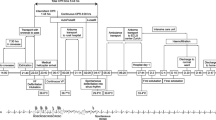Abstract
Herein we report the case of a patient who suffered from global cerebral ischemia due to pump stoppage of Jarvik2000 Left ventricular assist device (LVAD) for unknown reason and fatal ventricular arrhythmia at home. Cardiopulmonary resuscitation was started by paramedics 6–7 min after the patient fell down. The patient was transferred to our hospital after the restoration of the LVAD function by exchanging external cables. Mild therapeutic hypothermia was induced and body temperature was kept at 33 °C for 24 h. After rewarming, the patient recovered his consciousness without any neurological deficit.

Similar content being viewed by others
References
Birks EJ, Tansley PD, Yacoub MH, Bowles CT, Hipkin M, Hardy J, Banner NR, Khaghani A. Incidence and clinical management of life-threatening left ventricular assist device failure. J Heart Lung Transpl. 2004;23:964–9.
Benson DW, Williams GR, Spencer FC, Yates AJ. The use of hypothermia after cardiac arrest. Anesthn Analg. 1959;38:423–8.
Holzer M, Cerchiari E, Martens P, Roine R, Sterz F, Eisenburger P, et al. The hypothermia after cardiac arrest study group: mild therapeutic hypothermia to improve the neurologic outcome after cardiac arrest. N Engl J Med. 2002;346:549–56.
Hazinski MF, Nolan JP, Becker LB, Steen PA. Controversial topics from the 2005 International Consensus Conference on cardiopulmonary resuscitation and emergency cardiovascular care science with treatment recommendations. Circulation 2005;112:III-113-6.
Pang PYK, Wee GHL, Huang MJ, Hoo AEE, Tahir Sheriff IM, Lim SL, Tan TE, Loh YJ, Chao VTT, Soon JL, Kerk KL, Abdul Salam ZH, Sin YK, Lim CH. Therapeutic hypothermia may improve neurological outcomes in extracorporeal life support for adult cardiac arrest. Heart Lung Circ. 2017;26:817–24.
Heidlebaugh M, Kurz MC, Turkelson CL, Sawyer KN. Full neurologic recovery and return of spontaneous circulation following prolonged cardiac arrest facilitated by percutaneous left ventricular assist device. Ther Hypothermia Temp Manag. 2014;4:168–72.
Siegenthaler MP, Frazier OH, Beyersdorf F, Martin J, Laks H, Elefteriades J, Khaghani A, Kjellman U, Koul B, Pepper J, Jarvik R, Westaby S. Mechanical reliability of the Jarvik 2000 Heart. Ann Thorac Surg. 2006;81:1752–9.
Kohno H, Matsumiya G, Sawa Y, Ono M, Saiki Y, Shiose A, Yamazaki K, Matsui Y, Niinami H, Matsuda H, Kitamura S, Nakatani T, Kyo S. The Jarvik 2000 let ventricular assist device as a bridge to transplantation: Japanese Registry for Mechanical Assisted Circulatory Support. J Heart Lung Transpl. 2018;37:71–8.
Author information
Authors and Affiliations
Corresponding author
Ethics declarations
Conflict of interest
The authors declare that they have no conflict of interest.
Additional information
Publisher’s Note
Springer Nature remains neutral with regard to jurisdictional claims in published maps and institutional affiliations.
Rights and permissions
About this article
Cite this article
Saito, S., Toda, K., Miyagawa, S. et al. Therapeutic hypothermia after global cerebral ischemia due to left ventricular assist device malfunction. J Artif Organs 22, 246–248 (2019). https://doi.org/10.1007/s10047-019-01099-2
Received:
Accepted:
Published:
Issue Date:
DOI: https://doi.org/10.1007/s10047-019-01099-2




